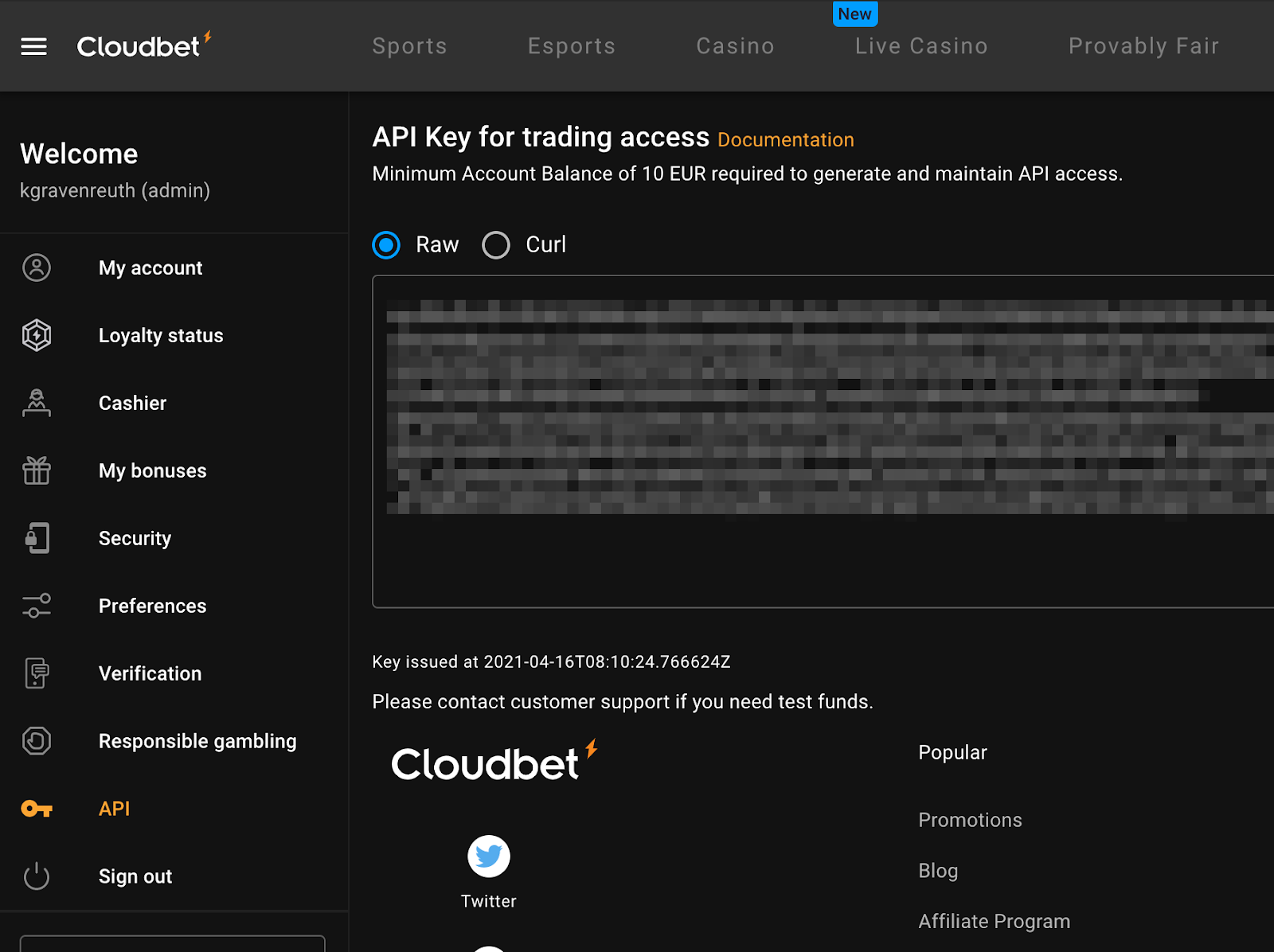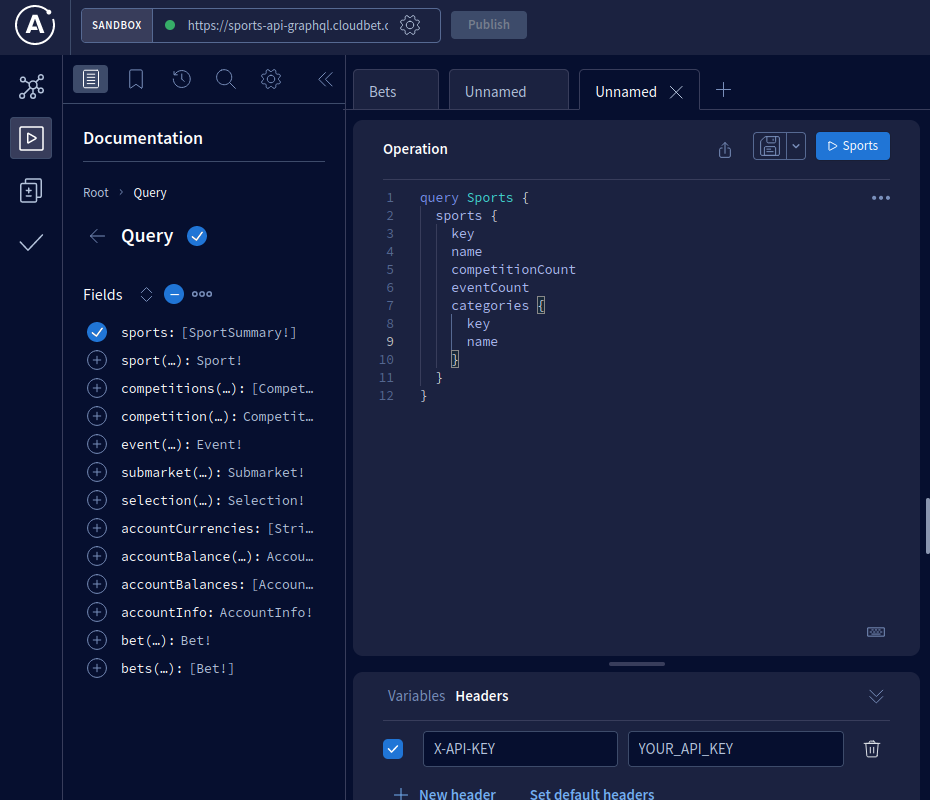In April 2021, Cloudbet released its public Sports RESTful API. We have updated it with several updates over the past year, and have also provided developer resources such as how to use the Cloudbet Betting REST API with Golang.
This year, our focus is on how to make the Cloudbet API accessible to more users and to make it as developer friendly as possible. With this goal in mind, we are releasing an early Alpha version of the Cloudbet Sports GraphQL API. GraphQL allows you to query for just the API response fields that you need rather than having to parse through a bucketload of irrelevant information. Furthermore, you can create bet placement requests more easily by consuming the Cloudbet Feed API in a more intuitive way.
In this article, @kgravenreuth walks you through the Cloudbet GraphQL API with Node.js JavaScript code examples.
Contents
Obtain your Cloudbet API Token
The Cloudbet GraphQL API uses the same API Key that you would use to interact with our RESTful API. The API Key is sent as the value of the X-API-Key header, just as with the REST API.
For further information about how to obtain the API Key from your Cloudbet website player account, please refer to our REST API article.

Brief introduction to GraphQL
GraphQL is a query and manipulation language for APIs and it provides a type system for describing data. Also, It allows clients to request the exact data that they need with a single API call as opposed to traditional REST APIs which return full payload entities on different API endpoints, resulting in excessive API calls.
Visit the Official GraphQL Documentation for more information.
Get started with the Cloudbet GraphQL API Explorer
One of the advantages of using GraphQL is that the API documentation comes built-in with every GraphQL API and is presented to you in a standardized way.
Both the GraphQL API documentation and GraphQL API endpoints are available at https://sports-api-graphql.cloudbet.com/graphql.
Visiting this endpoint directly will give you a GUI for interacting with our GraphQL API. We are using the Apollo GraphQL Explorer which provides interactive query building. After placing your API key as the value of X-API-KEY header in the Headers section of the GUI (refer to the screenshot), you can build your own GraphQL query and test it out easily.

Also, you can navigate our GraphQL schema reference by clicking the “Schema” icon from the left sidebar. Then, you can see the detailed documentation about query/mutation/types defined in our GraphQL schema. Each of the request and response fields are documented in detail along with examples (refer to screenshot below).

Compared to our existing OpenAPI based Cloudbet REST API documentation, the GraphQL explorer GUI provides you clearer documentation and an interactive query builder to get started more easily.
Use GraphQL with Node.js
Pre-requisites
To query and place bets with Node.js + GraphQL, you’ll need the following:
- Install Node.js on your machine. If you are on Windows, you can download it from the official site. If you are on Linux or Mac OS, you can use your Operating System’s package manager, such as Homebrew for MacOS.
- Initialize your working directory with mkdir myapp && cd myapp
- Create a new Node.js project with npm init
- Install the axios Node.js library for making HTTP requests with npm install axios
Overview
- Cloudbet GraphQL API calls are sent via https://sports-api-graphql.cloudbet.com/graphql.
- You would always send either GraphQL queries or mutations in your requests with variables for dynamic values.
- Your API Key is sent as the value of the X-API-KEY HTTP header.
In the following sections, we will walk you through the process of fetching odds for upcoming events and placing bets on the odds obtained. You can request odds by competition, or fetch fixtures for a given date. You can also fetch odds for a specific market for a given sport. Finally we will show you how to place bets on these fetched odds and check the bet status for bet settlement.
In general the process works as follows:
- Get details about upcoming events for your favorite sports. You can request fixtures information without odds if you so desire from the same endpoint with a different query structure for events several days in the future.
- Obtain odds from all events of a sport or a competition for a given market or line.
Query sport fixtures
You can start by querying what sports we are offering currently. You can use the following “sports” query to find different sports and what categories we are offering per sport. Categories refer to grouping of competitions, e.g. all Soccer competitions in England would be under the “England” category.
Save the above file as example_1.js and run it with the command node example_1.js after replacing “YOUR_API_KEY” with the value of your actual API Key.
This would give you a JSON response similar to the following with a list of sports and categories.
Query odds for a category
After knowing all the available sports, you may want to get the latest odds and data for a specific sport or competition.
Let’s say you want to query odds for all English soccer competitions on 16th April 2022. You can query the categoryKey “england” and the sportKey “soccer” obtained from the previous sports query to list all the available competitions for the given date.
Competitions provide a list of events and events provide a list of markets on which odds are being offered. For each market, there is a list of submarkets and submarkets are broken down by event periods e.g. full time, 1st half, etc.Inside each submarket, there are several selections. Each selection has a different market URL which uniquely identifies it. The market URL is composed as <marketkey>/<outcome>?<params> and can be used to place bets through GraphQL API directly.
This would give you the odds for all English competitions on the given date, similar to the following sample response.
In general, responses for the rest of the odds queries follow the response structure mentioned above for markets, submarkets, selections and price etc.
Query odds for a specific competition
With the query above, you can get odds for all English soccer competitions on a specific date.
If instead, you are only interested in the English Premier League and only in some specific markets, you can use the competition query for live and upcoming events by specifying competition key, market key and date.
Query odds for specific line
A line consists of a set of interdependent selections whose total implied probability is > 100%. With our GraphQL API, you can odds for a specific line with a line query.
Let’s say you are only interested in an Asian Handicap line with the parameter handicap value = -1. You can query a specific line by the line id. The line id is composed of <event-id>/<market-key>?<params>, e.g. 9855572/soccer.asian_handicap?handicap=-1 in the example, or 9855572/soccer.total_goals if the market does not have any params (i.e. params are optional for some markets). It will return a list of selection odds for this specific line.
Sample response:
Get account balances
Before placing a sports bet, you may want to check available currencies that you can place bets with.
Using the following query you will get a list of account balances for each currency you have currently.
Place sports bet
To place a sports bet, you need to construct the following input payload by specifying the reference id in uuid format, event id, market URL that describes the market selection, available price offered, the desired stake with the currency you want to place with. You can obtain all this information from the feed queries like “sport”, “competition”, “event”, etc. Compared to our existing REST API, you do not need to construct the market URL by yourself now and can obtain the market URL from the feed directly.
Also, we separate the bet error code from the existing bet status so it is much easier for users to distinguish between the accepted and rejected bets.
Check placed bet & settlement
After placing a bet, you can query the bet by reference id to check the bet status. Usually, pre-match bets are accepted or rejected within a few seconds. During in-play betting, the bet may take a longer time to get accepted or rejected depending on the state of the live event.
With our GraphQL API, you can query a chronological bet history of all your accepted bets. Here, we will make use of GraphQL to combine accountBalances and bets queries together so you can get your account balances for all currencies along with the bet history with a single network request. In the following example, you can use the “limit” argument to request how many bets to be shown starting from the last placed bet.
Conclusion
Compared to the existing Cloudbet REST API, the GraphQL API allows you to query Cloudbet odds feed in a flexible way since our REST API may have data which is irrelevant to your specific needs. Now you can query the exact data that you need by specifying the desired fields. Also, you can now query all live and upcoming event odds under a specific sport using a single query which would usually take multiple REST API calls to construct otherwise.
Finally, you can place bets and query your account details and bet history by querying a single GraphQL endpoint which makes creating a Trading Bot easier than ever.
Additional resources
These are some additional resources for you to explore the Cloudbet API further.
- Cloudbet Sports Betting API Tutorial With Golang: Blog Article on using the Cloudbet REST API
- Cloudbet Feed API Documentation: Swagger Documentation for our Odds API
- Cloudbet Trading API Documentation: Swagger Documentation for our Betting API
- Cloudbet Account API Documentation: Swagger Documentation for our Account API to which gives you information about your Cloudbet account, such as available currencies
- Postman Collection for Cloudbet Feed, Trading and Account APIs
- Cloudbet NPM SDK: You can use this SDK to render markets
- Building a Sports Odds Platform using Cloudbet Market Helper: A SDK for the Cloudbet Feed API. You can use this to read betting markets and lines and build sports odds comparison platforms
- CodeSandbox Demo of using our Feed API + SDK
- Cloudbet API Github Docs: Cloudbet API Code Samples, Protobuf Schemas and more details about events and markets provided by the API are available here
Feedback & Q/A
Feel free to ask questions on our Github discussion forum at https://github.com/Cloudbet/docs/discussions.






